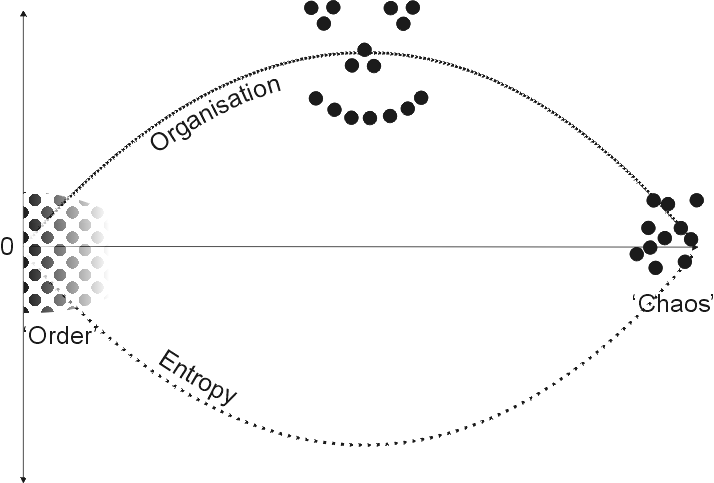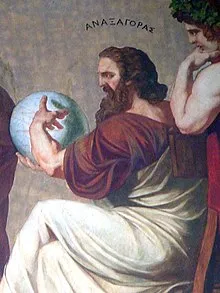Look around an you’ll see an ordered world. An ordered Universe.
You’ll also see it tends towards disorder. Things fall apart. Stars die. Mind and external energy are required for the upkeep of things.
These two observations are (sort of) basically all we need to know God exists.

Random picture I found on the Internet explaining entropy
Here’s the argument:
1. The world is ordered.
2. The world tends towards disorder.
3. If the world tends towards disorder, then organization of the world increases the farther we look back in time.
4. If the world is ordered and organization of the world increases the farther we look back in time and the world had a beginning, then organization of the world was maximal at the beginning of time.
5. If organization of the world was maximal at the beginning of time, then the world was initially ordered by a mind.
6. If the world was initially ordered by a mind, then God exists.
7. The world had a beginning.
∴ God exists.
(Note that by “the world” I basically mean the Universe.)
This is a valid deductive argument. I could show you in sentential logic, if you want. That means, if the premises are true, the conclusion must be true.
In fact, if the premises are probably true, the conclusion is also probably true. All I must do is demonstrate that these premises are more likely valid than not.
Premise 1
The world is ordered.
Look around. There is order: complex biological systems, stars, planets, a water cycle, planetary orbits, etc.
There could be matter and energy spread evenly throughout the Universe. Instead, it’s put together into useful forms.
That means that the order in the world is greater than 0, at the very least, which is all we need for this argument.
Premise 2
The world tends towards disorder.
Here’s where the second law of thermodynamics comes in.
In its most basic form, the second law states that energy tends towards equilibrium.
If there’s a hot thing and a cold thing, the energy will dissipate so that it spreads equally between them.
Differing levels of energy are required for order, and completely even distribution of energy is disorder, so it follows from the second law that order tends to disorder.
Put another way, the second law states that entropy (i.e. non-usefulness of energy or disorder) increases.
My definitions are not technical, but they suffice for our purposes.
Premise 3
If the world tends towards disorder, then organization of the world increases the farther we look back in time.
I don’t expect anyone would deny this.
Premise 4
If the world is ordered and organization of the world increases the farther we look back in time and the world had a beginning, then organization of the world was maximal at the beginning of time.
Same.
Premise 5
If organization of the world was maximal at the beginning of time, then the world was initially ordered by a mind.
There are three possibilities. Either:
I. The world was ordered by a mind,
II. The world was ordered by the physical, or
III. The world was ordered ex nihilo.
III is obviously absurd. How about II?
I don’t think there could be any physical thing at the very beginning of time that could order things, so II is out.
I is the only option left.

Anaxagoras
Some Pre-Socratics had a sinilar idea, of a mind that orders the world.
Anaxagoras (c. 510-428 BC) conceived of a mind, nous, which ordered the world and set it in motion.
The Stoics and Philo of Alexandria conceived of a similar mind, which they called the logos.
We find the logos in the first verse of the Gospel according to John:
In the beginning was the Word [Gr. logos] and the Word was with God and the Word was God.
Somehow, the neoplatonists expanded this concept to a tripartite God, incredible in its similarity to the Christian trinity.
Premise 6
If the world was initially ordered by a mind, then God exists.
Technically, this only demonstrates the existence of a powerful, transcendent, mind, but I think it’s fair enough to call this mind “God.”
Call it nous or logos if you want.
Premise 7
The world had a beginning.
I might try turning to science here, but instead I’ll go to philosophy.
Consider a hotel with infinite rooms and infinite guests. Now imagine all the guests in the even-numbered rooms check out. In math, you can’t do infinity minus infinity. It just doesn’t work.
Therefore, this situation is impossible.
And why is it impossible? Because an actual infinity is impossible.
And if an actual infinity is impossible, the Universe can’t be infinity years old.